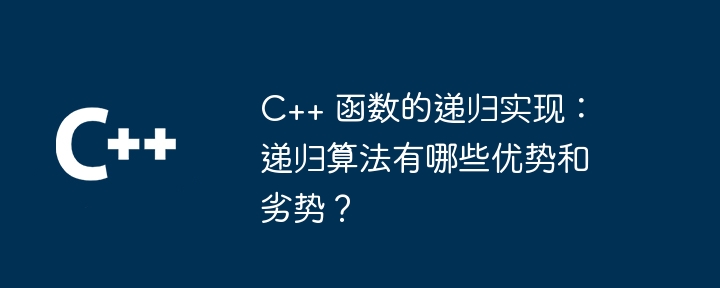Home >Backend Development >C++ >Recursive implementation of C++ functions: What are the advantages and disadvantages of recursive algorithms?
Recursive implementation of C++ functions: What are the advantages and disadvantages of recursive algorithms?
- 王林Original
- 2024-04-23 08:30:01867browse
C Function recursion is a process in which a function calls itself. It has the advantages of simplicity and modularity, but is inefficient and prone to stack overflow. Its uses include factorial calculations and tree structure traversal. When implementing recursion in C, attention needs to be paid to base cases and recursive calls to ensure that the algorithm terminates correctly.

Recursive implementation of C function
Recursion is a process in which a function calls itself within itself. In C, this technique can be used to solve many problems.
Advantages of recursive algorithms
- Simplicity: Recursive algorithms are generally more concise than iterative algorithms.
- Easy to understand: Recursive algorithms are easier to understand and debug because they follow the stack structure of function calls.
- Modularity: Recursive algorithms can be broken down into smaller, more manageable modules.
Disadvantages of recursive algorithms
- Inefficiency: Recursive algorithms may be less efficient than iterative algorithms because of the larger overhead of function calls and stack operations.
- Stack overflow: Recursive algorithms may cause stack overflow if there are too many call levels.
- Difficult to optimize: Due to the higher overhead of function calls, recursive algorithms are difficult to optimize.
Practical case
The following is an example of a recursive function using C to implement factorial calculation:
int factorial(int n) {
if (n == 0) {
return 1;
}
return n * factorial(n - 1);
}Code explanation
- Basic situation : If
nis 0, then the factorial is 1. - Recursive call: For any other value, the function calls itself, decrementing
nby 1, and multiplying it with the currentn. - Recursion terminates: Recursion continues until
nreaches the base case (0), and then the system begins to retract function calls.
Other uses of recursive algorithms
Recursive algorithms can also be used to solve many other problems, including:
- Traversal of tree structures
- Maze Solving
- Sort Algorithm
- Implementation of Data Structure
Conclusion
Recursion is a powerful programming technique, but it requires Pay attention to its strengths and weaknesses. Recursion is a good choice when simplicity, ease of understanding, or modularity of an algorithm is required. However, if efficiency is a primary concern, an iterative algorithm should be used.
The above is the detailed content of Recursive implementation of C++ functions: What are the advantages and disadvantages of recursive algorithms?. For more information, please follow other related articles on the PHP Chinese website!

